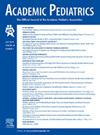父亲不良童年经历、行为健康与父亲压力与满意度。
IF 2.8
3区 医学
Q1 PEDIATRICS
引用次数: 0
摘要
目的:本研究采用具有全国代表性的样本,探讨父亲不良童年经历(ace)与父亲养育之间的关联,以及父亲的行为健康是否介导了这种关联。方法:来自4814名父亲的数据,他们在青少年到成人健康的国家纵向研究中从青春期到成年早期被跟踪。父亲的平均年龄为33岁,自认为是非西班牙裔白人(64%),其次是非西班牙裔黑人(17%)或西班牙裔(12%)。父亲们在第1-4阶段自我报告了13项ace,在第4或第5阶段评估了两项行为健康(抑郁症状和饮酒)和父亲(压力和满意度)。采用结构方程模型,通过行为健康检验父亲ace与父亲养育之间的直接和间接途径,估计多重中介模型。结果:ACE对父亲满意度有显著的直接影响(B = -0.04,标准误差(se) = 0.02, p)。结论:研究结果提示接触和参与ACE暴露父亲在行为健康和育儿干预中的重要性。鉴于父亲的健康促进对其子女有好处,利用儿科接触来确定有风险的父亲有可能改善父亲和儿童的健康。本文章由计算机程序翻译,如有差异,请以英文原文为准。
Fathers’ Adverse Childhood Experiences, Behavioral Health, and Fathering Stress and Satisfaction
Objective
Using a nationally representative sample, this study examined associations between fathers’ adverse childhood experiences (ACEs) and fathering and whether fathers’ behavioral health mediated this association.
Methods
Data from 4814 fathers who were followed from adolescence through early adulthood in the National Longitudinal Study of Adolescent to Adult Health. On average, fathers were 33 years old and self-identified as non-Hispanic White (64%), followed by non-Hispanic Black (17%) or Hispanic (12%). Fathers self-reported on 13 ACEs during waves 1 to 4 and 2 measures of behavioral health (depressive symptoms and alcohol consumption) and fathering (stress and satisfaction), assessed at wave 4 or 5. A multiple mediation model was estimated using a structural equation model to examine direct and indirect pathways between fathers’ ACEs and fathering, through behavioral health.
Results
There was a significant direct effect of ACEs on fathering satisfaction (B = −0.04, standard error (SE) = 0.02, P < .01), as well as a significant indirect effect through fathers’ depressive symptoms (B = −0.04, SE = 0.01, P < .001), resulting in a total effect of −0.08 (SE = 0.02, P < .001). Fathers’ ACEs were also linked to heavy drinking (B = 0.01, SE = 0.00, P < .05). ACEs were not associated with fathering stress.
Conclusions
Findings indicate the importance of reaching and engaging ACE-exposed fathers in behavioral health and parenting interventions. Given that health promotion in fathers has benefits for their children, leveraging pediatric encounters to identify at-risk fathers has the potential to improve both fathers’ and children’s health.
求助全文
通过发布文献求助,成功后即可免费获取论文全文。
去求助
来源期刊

Academic Pediatrics
PEDIATRICS-
CiteScore
4.60
自引率
12.90%
发文量
300
审稿时长
60 days
期刊介绍:
Academic Pediatrics, the official journal of the Academic Pediatric Association, is a peer-reviewed publication whose purpose is to strengthen the research and educational base of academic general pediatrics. The journal provides leadership in pediatric education, research, patient care and advocacy. Content areas include pediatric education, emergency medicine, injury, abuse, behavioral pediatrics, holistic medicine, child health services and health policy,and the environment. The journal provides an active forum for the presentation of pediatric educational research in diverse settings, involving medical students, residents, fellows, and practicing professionals. The journal also emphasizes important research relating to the quality of child health care, health care policy, and the organization of child health services. It also includes systematic reviews of primary care interventions and important methodologic papers to aid research in child health and education.
 求助内容:
求助内容: 应助结果提醒方式:
应助结果提醒方式:


